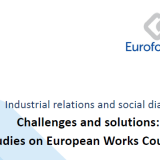
Työmarkkinasuhteet ja työmarkkinaosapuolten vuoropuhelu
Yksi Eurofoundin vuosien 2021–2024 työohjelman kuudesta keskeisestä toimesta on työmarkkinasuhteet ja työmarkkinaosapuolten vuoropuhelu. Eurofound jatkaa työtään asiantuntijakeskuksena, joka seuraa ja analysoi työmarkkinasuhteiden ja työmarkkinaosapuolten vuoropuhelun kehitystä jäsenvaltioissa ja EU:n tasolla. Se tukee edelleen johdon ja työntekijöiden välistä vuoropuhelua, myös covid-19-pandemian vaikutuksista, ja hyödyntää siinä Eurofoundin kansallisten yhteyshenkilöiden verkoston asiantuntemusta.
Eurofound tuottaa neljän seuraavan vuoden aikana tärkeää tietoa haasteista ja tulevaisuudennäkymistä työmarkkinasuhteiden ja työmarkkinaosapuolten vuoropuhelun alalla EU:ssa. Eurofound tekee selkoa tärkeimmistä kehityskuluista, jotka vaikuttavat työmarkkinasuhteiden toimijoihin, prosesseihin ja keskeisiin tuloksiin, ja hyödyntää siinä vakiintunutta asiantuntemustaan alalta. Se vertailee työmarkkinasuhteiden kansallisia järjestelmiä, muun muassa kansallista työmarkkinaosapuolten vuoropuhelua ja työehtosopimusneuvotteluja . Eurofound hyödyntää vuonna 2020 perustettua COVID-19 EU PolicyWatch -tietokantaansa ja seuraa hallitusten, työmarkkinaosapuolten ja muiden toimijoiden poliittisia aloitteita, joilla pyritään pehmentämään kriisin sosiaalisia ja taloudellisia vaikutuksia sekä auttamaan elpymistoimissa. Se jatkaa säännöllistä raportointiaan palkan muodostumisen , vähimmäispalkan ja työajan kehityksestä sekä työelämään liittyvistä tuloksista.
Eurofoundin asiantuntemuksella tuetaan työmarkkinaosapuolten valmiuksien kehittämistä, jotta saadaan aikaan tehokasta työmarkkinaosapuolten vuoropuhelua. Virasto myös edistää eurooppalaisen työmarkkinaosapuolten vuoropuhelun kehittämistä tarkastelemalla työmarkkinajärjestöjen edustavuutta eri sektoreilla ja arvioimalla niiden kykyä osallistua työmarkkinaosapuolten komiteoihin.
- Infografiikka: Työmarkkinasuhteet ja sosiaalinen vuoropuhelu EU:ssa
”Tehtävänämme on tukea johdon ja työntekijöiden välistä vuoropuhelua. Mielestäni kokoamamme tiedot ja tekemämme tutkimus ovat tärkeitä, jos ne auttavat itse toimijoita toimimaan paremmin. Vilkas työmarkkinaosapuolten vuoropuhelu on osa sitä, mitä voitaisiin sanoa sosiaaliseksi markkinataloudeksi, ja juuri se on Euroopan unionin tavoitteena.”
David Foden, työmarkkinasuhteiden neuvonantaja




























